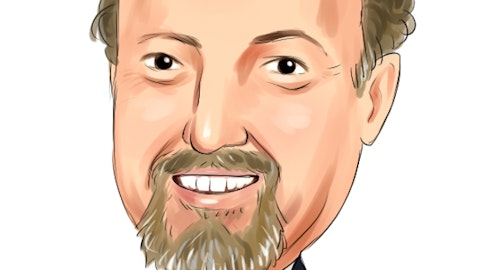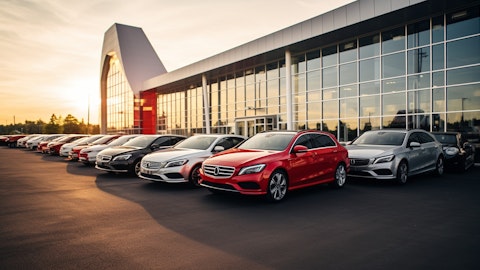Harrie Schippers: Yes, more or less similar. I think Europe is a little softer, so you’d expect some effect from that in Europe. But also in Europe, the new DAF continues its premium position. And as a result, we get excellent margins on those trucks.
Tami Zakaria: Got it. Okay. That’s all I had. Thank you.
Preston Feight: Great. Thanks, Tami.
Operator: Thank you. Our next question is from Chad Dillard from AllianceBernstein. Chad, please go ahead. Your line is open.
Chad Dillard: Hey. Good morning, guys. I was hoping you could unpack your gross margin guide of 18.5% to 19%. Maybe give some puts and takes of trucks versus parts. And then as you’re thinking about like the full year, it sounds like parts are going to grow by mid-single digits. Should we expect gross margins in that business to continue that upward path?
Preston Feight: Well, I think what we would — in the unpack, I like your term, what I would share with you is the parts business continues to do really well. Last year was a record, as we mentioned or Harrie mentioned in his comments, and we expect them to have a fantastic year this year as well. So even in truck market sizes that may moderate a little bit, we see the parts business doing a fantastic job. And that’s because of the expansion in new PDCs. It’s because of the connectivity that we’re providing in the trucks. It’s because of our great dealer network. And I think all of the benefits we provide to our customers. So I expect parts to continue to hum. And on the truck side, again, great new trucks are providing good margin performance. And obviously, doing a fantastic job for our customers. That’s what we see out there. And that’s contributing to the strong truck margins.
Chad Dillard: Got it. Okay. And just a second question, just on your SpinCo profitability. Just trying to think through the moving parts in 2024, do you expect that profitability to grow. To what extent are you contemplating any buy downs or any additional reserves given just like the sale truck market?
Harrie Schippers: We saw some more normalized used truck prices in the fourth quarter. And as a result, the good performance of PACCAR Financial at $113 million for the quarter. And if we now look at this year, we expect PACCAR Financial to continue that good performance also in the quarters of this year.
Chad Dillard: Great. Thank you. I’ll pass the.
Harrie Schippers: Appreciate it.
Operator: Thank you. Our next question today is from David Raso from Evercore ISI. David, please go ahead. Your line is open.
David Raso: Hi. Thank you. Kind of looking beyond 2024, the notion of a pre-buy. I’m just curious, conversations you’re having today now that we’re in 2024. On customers’ thoughts of any pulling forward of, say, second half 2026, 2027 into next year. Anything at all about timing of orders to maybe reflect if we do see a pre-buy in 2025. Just trying to get a sense of how you’re thinking about that concept moving forward? Thank you.
Preston Feight: Sure, sure. I mean, let me start by saying that it’s not just a truckload carrier market out there. And in the LTL, the medium duty and the vocational markets, we’re seeing strong performance of the products and strong interest from the customers with good order intake. I’d also say that from an overall PACCAR standpoint, as I mentioned, our global markets are doing quite well for us. but to dial in a little bit to your question, David, what I think is happening is the good operators, the ones that are thinking clearly about long term are continuing to buy trucks. And so they’re looking to keep their fleet at a reasonable age and buying trucks and continuing that pattern. And then they’re managing that against the fact that contract rates and spot rates are lower than they were and trying to maintain that balance of fleet age with capital spending.
And we think that’s going to continue. We think that there’s an emissions change in 2027 and that the sophisticated buyers are conscious of that and take that into consideration as they make their purchase plans. And that will have an increasing effect as we move forward.
David Raso: But just to be clear on timing, do you think some of that desire to buy in front of that would show up in orders in 2024 at all, or is that a little premature?
Preston Feight: I think it’s fleet dependent. I think it depends on where they’re at and what they’re hauling, and I think how they’re doing and how many trucks they need in their fleet. So I think generalizing that into 2024 might be a little much, but the premise of your conversation or our conversation about does that feature into the — later this year or next year or the year after? I think there’s some truth in that. I think we see positive benefit from that.
David Raso: Okay. Thank you very much. I appreciate it.
Preston Feight: You bet.
Operator: Thank you. Our next question today is from Jeff Kauffman from Vertical Research Partners. Jeff, please go ahead. Your line is open.
Jeff Kauffman: Thank you very much. Well, first of all, congratulations, fantastic year.
Preston Feight: Hey, Jeff, thank you for that. Our team appreciates it.




